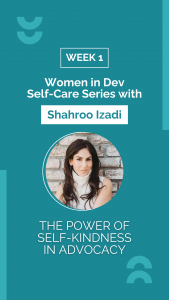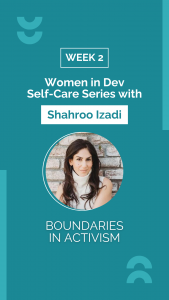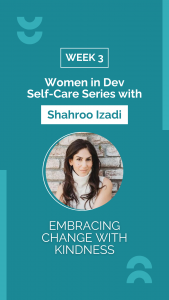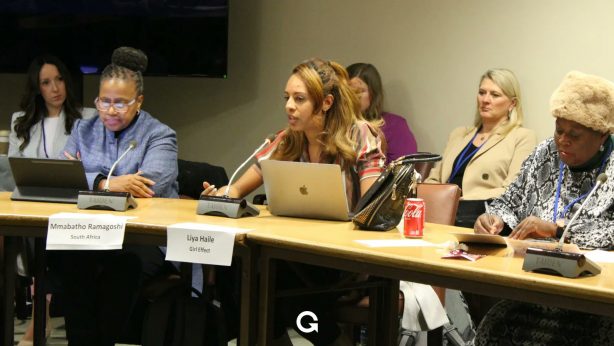The Power of Self-Kindness in Advocacy: Shahroo Izadi
In the relentless pursuit of advocating for others, it’s all too easy to neglect the one person who champions the cause day in and day out – yourself!
As advocates, we are steadfast in our commitment to driving positive change, often pouring our hearts and souls into the issues we champion. Yet, amidst the passion of our advocacy, the importance of safeguarding our mental wellbeing can inadvertently take a back seat…
Just like the causes we champion, our mental health requires dedicated attention and care. In November, we once again teamed up with Behavioural Change Specialist, Shahroo Izadi, to share some simple and actionable practices for these often hard-to-grasp and seemingly abstract concepts of self-care and mental health to incorporate into your day-to-day as an individual who works in advocacy.
Here is a rundown of what our weekly sessions dove into:
The Power of Self-Kindness in Advocacy
We all go through difficult periods when it comes to our mental health and wellbeing. And we can probably all remember a time when we’ve supported someone else who was struggling. But how did you support them? How did you speak to them and what words did you use?
Shahroo reminds us that it’s about time we all showed ourselves the same kindness that we show our colleagues or friends when facing these struggles. Essentially, we need to close the gap between how we treat others and how we treat ourselves.
“Don’t make yourself an exception. You deserve kindness too.”

Setting Boundaries
Setting boundaries can be a huge challenge—especially for women. Even more so for women working in the nonprofit sector, where we feel we have a moral obligation to surrender completely to our work commitments…
We all need to learn the art of saying no. Self-preservation is critical to being able to make an impact and help people long-term. We have to put on our own oxygen mask first. Otherwise, we simply burn out, which is no help to anyone.

Embracing Change with Kindness
When we go through the inevitable setbacks and disappointments that come with working in this sector, our response is often to jump back in immediately.
We think this will help us to cope or that we owe it to our work to get straight back on the horse in a desperate attempt to rectify whatever didn’t go to plan…
However, this means we neglect to soothe and heal the part of us that is heartbroken at the injustice. We are allowed to be upset and complain. And we are allowed to take a break to reset and ensure that when we get back to action, we do so with restored energy and motivation!

Being Selfish in order to be Selfless
Last but certainly not least, we all know that working in this sector requires being calm, consistent, and resilient. But often, this comes at a cost…
In order to continue to show up and contribute to the causes we work on and ultimately help other people, we must ensure that our own needs are met first.
Self-care is not selfish! In fact, it is essential if we are to be the caring, compassionate humans that we want to be.
How do you ensure you take care of yourself so that you can show up at work with a full cup?
What could you do better?

Some Final Thoughts
To conclude, in the realm of advocacy, where passion fuels our pursuits, it’s crucial to acknowledge that the strength of our impact is inherently tied to the wellbeing of the advocate.
As we navigate the intricate web of causes and campaigns, let us remember the profound influence of a rested mind, a nurtured spirit, and a cared-for body and soul.
Caring for our mental health isn’t a luxury; it’s a strategic necessity. In fostering a culture that prioritises the mental well-being of advocates, we fortify the foundation upon which transformative change is built.
So, let this serve as an unwavering call to action: commit to the advocacy of self, recognising that in cultivating a healthy mind, we not only enhance our own capabilities but also empower our advocacy to reach unprecedented heights.
Together, let us champion a future where the wellbeing of advocates stands as an integral part of the broader narrative of positive change.
By the Women in Dev Team in Collaboration with Shahroo Izadi.


